MNG91217: Reflective Essay on Project Management Principles
VerifiedAdded on 2023/05/29
|12
|2912
|222
Essay
AI Summary
This essay reflects on the application of project management principles, particularly within a software development context. It discusses the importance of the project lifecycle, including initialization (requirement documentation), planning, execution, monitoring and controlling, and closing. The essay also analyzes the significance of requirement analysis, risk management, stakeholder management, and the selection of appropriate project management methodologies like Agile. The reflection emphasizes the need for effective communication, knowledge sharing, and adapting to changes during the project lifecycle. The essay concludes that adhering to project management principles and continuous assessment of the project lifecycle are crucial for successful project outcomes, alongside proper risk and stakeholder management.

Running head: PROJECT MANAGEMNT PRINCIPALS
PROJECT MANAGEMNT PRINCIPALS
Name of the Student:
Name of the University:
Author Note:
PROJECT MANAGEMNT PRINCIPALS
Name of the Student:
Name of the University:
Author Note:
Paraphrase This Document
Need a fresh take? Get an instant paraphrase of this document with our AI Paraphraser
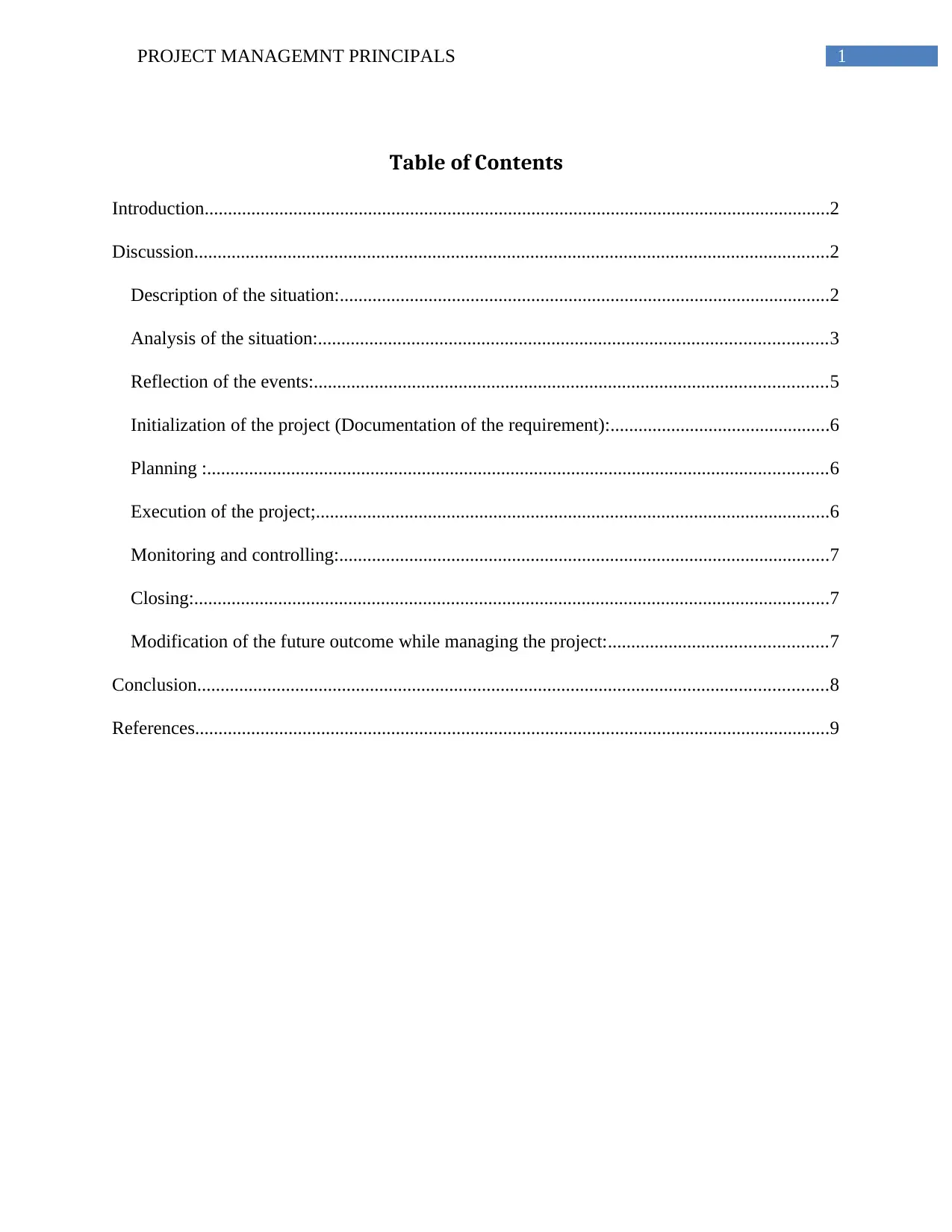
1PROJECT MANAGEMNT PRINCIPALS
Table of Contents
Introduction......................................................................................................................................2
Discussion........................................................................................................................................2
Description of the situation:.........................................................................................................2
Analysis of the situation:.............................................................................................................3
Reflection of the events:..............................................................................................................5
Initialization of the project (Documentation of the requirement):...............................................6
Planning :.....................................................................................................................................6
Execution of the project;..............................................................................................................6
Monitoring and controlling:.........................................................................................................7
Closing:........................................................................................................................................7
Modification of the future outcome while managing the project:...............................................7
Conclusion.......................................................................................................................................8
References........................................................................................................................................9
Table of Contents
Introduction......................................................................................................................................2
Discussion........................................................................................................................................2
Description of the situation:.........................................................................................................2
Analysis of the situation:.............................................................................................................3
Reflection of the events:..............................................................................................................5
Initialization of the project (Documentation of the requirement):...............................................6
Planning :.....................................................................................................................................6
Execution of the project;..............................................................................................................6
Monitoring and controlling:.........................................................................................................7
Closing:........................................................................................................................................7
Modification of the future outcome while managing the project:...............................................7
Conclusion.......................................................................................................................................8
References........................................................................................................................................9
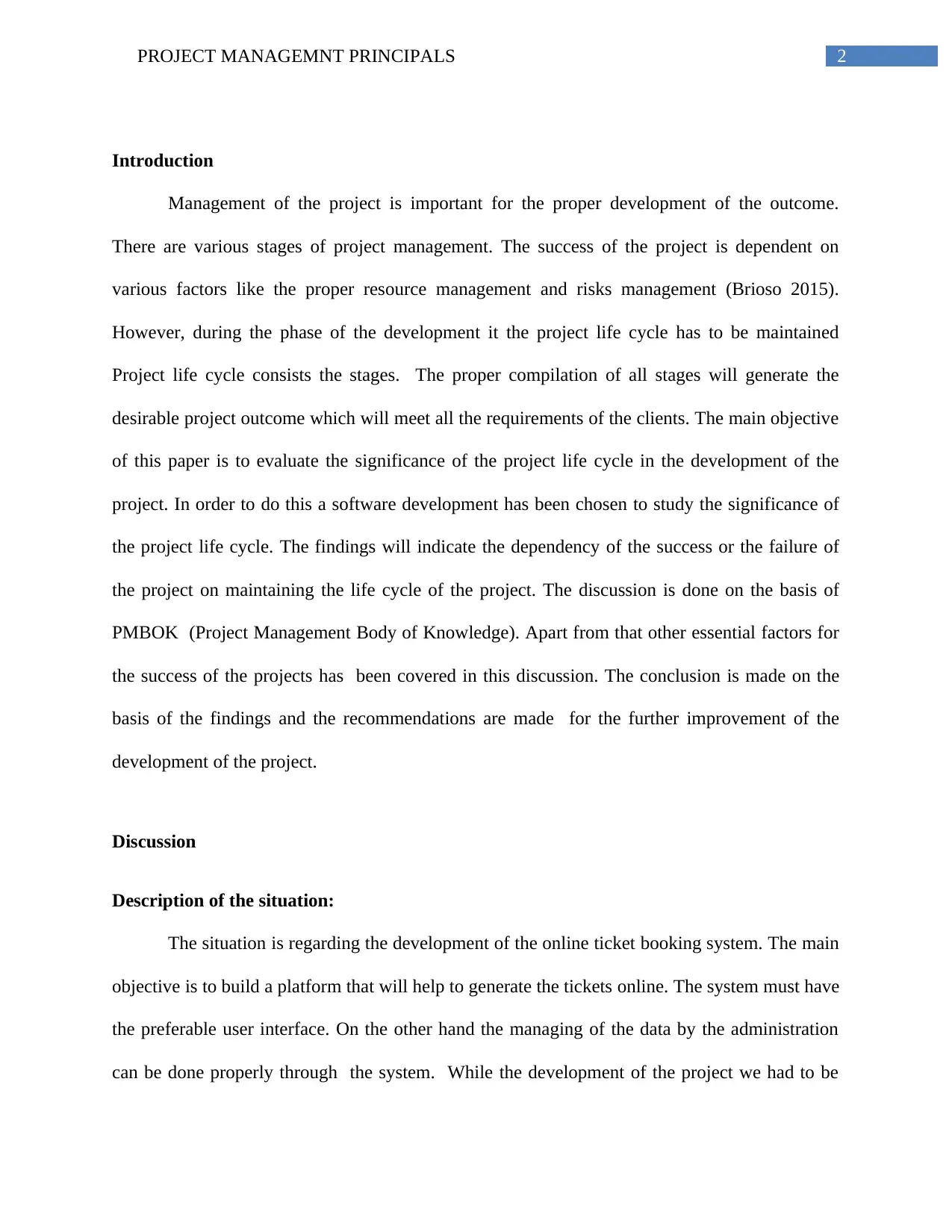
2PROJECT MANAGEMNT PRINCIPALS
Introduction
Management of the project is important for the proper development of the outcome.
There are various stages of project management. The success of the project is dependent on
various factors like the proper resource management and risks management (Brioso 2015).
However, during the phase of the development it the project life cycle has to be maintained
Project life cycle consists the stages. The proper compilation of all stages will generate the
desirable project outcome which will meet all the requirements of the clients. The main objective
of this paper is to evaluate the significance of the project life cycle in the development of the
project. In order to do this a software development has been chosen to study the significance of
the project life cycle. The findings will indicate the dependency of the success or the failure of
the project on maintaining the life cycle of the project. The discussion is done on the basis of
PMBOK (Project Management Body of Knowledge). Apart from that other essential factors for
the success of the projects has been covered in this discussion. The conclusion is made on the
basis of the findings and the recommendations are made for the further improvement of the
development of the project.
Discussion
Description of the situation:
The situation is regarding the development of the online ticket booking system. The main
objective is to build a platform that will help to generate the tickets online. The system must have
the preferable user interface. On the other hand the managing of the data by the administration
can be done properly through the system. While the development of the project we had to be
Introduction
Management of the project is important for the proper development of the outcome.
There are various stages of project management. The success of the project is dependent on
various factors like the proper resource management and risks management (Brioso 2015).
However, during the phase of the development it the project life cycle has to be maintained
Project life cycle consists the stages. The proper compilation of all stages will generate the
desirable project outcome which will meet all the requirements of the clients. The main objective
of this paper is to evaluate the significance of the project life cycle in the development of the
project. In order to do this a software development has been chosen to study the significance of
the project life cycle. The findings will indicate the dependency of the success or the failure of
the project on maintaining the life cycle of the project. The discussion is done on the basis of
PMBOK (Project Management Body of Knowledge). Apart from that other essential factors for
the success of the projects has been covered in this discussion. The conclusion is made on the
basis of the findings and the recommendations are made for the further improvement of the
development of the project.
Discussion
Description of the situation:
The situation is regarding the development of the online ticket booking system. The main
objective is to build a platform that will help to generate the tickets online. The system must have
the preferable user interface. On the other hand the managing of the data by the administration
can be done properly through the system. While the development of the project we had to be
⊘ This is a preview!⊘
Do you want full access?
Subscribe today to unlock all pages.

Trusted by 1+ million students worldwide
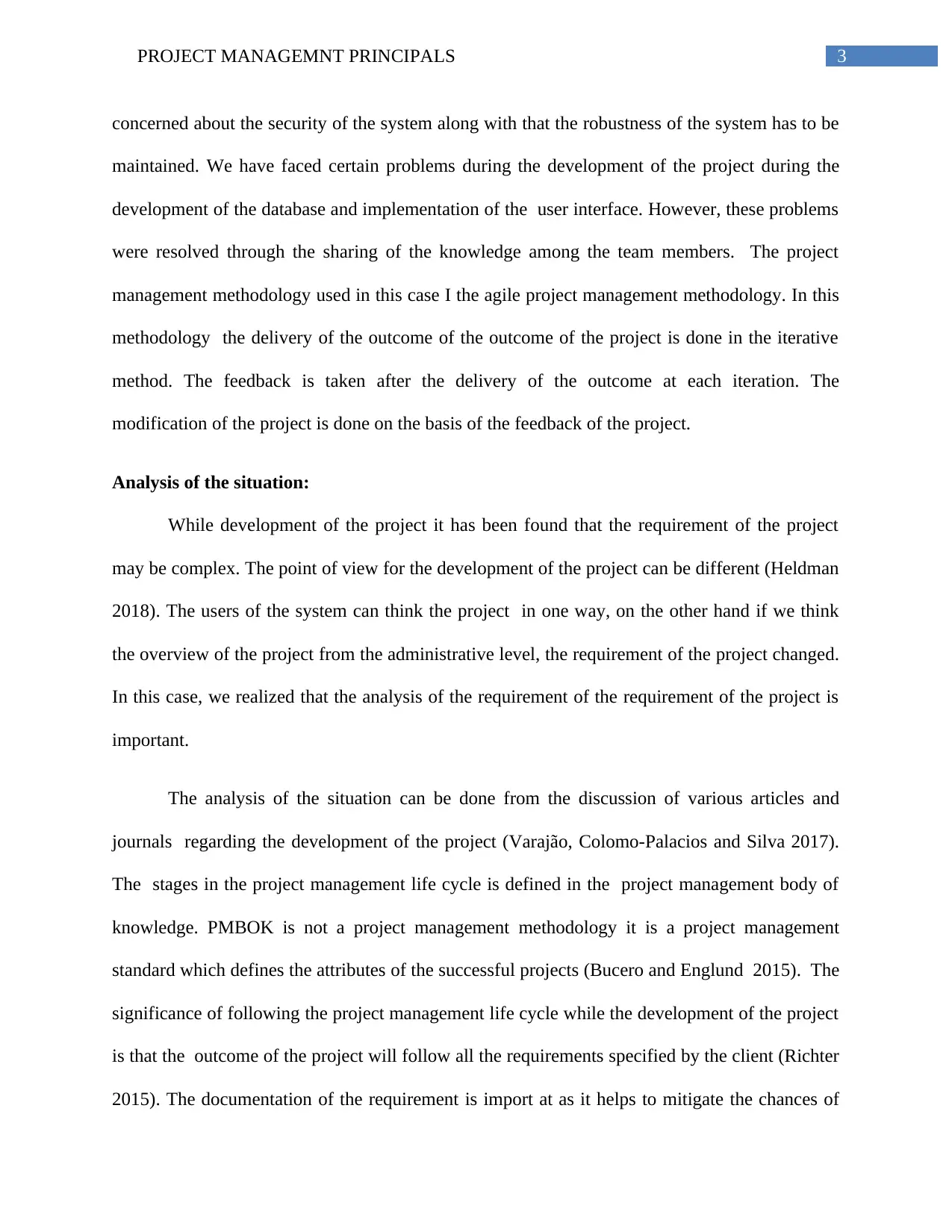
3PROJECT MANAGEMNT PRINCIPALS
concerned about the security of the system along with that the robustness of the system has to be
maintained. We have faced certain problems during the development of the project during the
development of the database and implementation of the user interface. However, these problems
were resolved through the sharing of the knowledge among the team members. The project
management methodology used in this case I the agile project management methodology. In this
methodology the delivery of the outcome of the outcome of the project is done in the iterative
method. The feedback is taken after the delivery of the outcome at each iteration. The
modification of the project is done on the basis of the feedback of the project.
Analysis of the situation:
While development of the project it has been found that the requirement of the project
may be complex. The point of view for the development of the project can be different (Heldman
2018). The users of the system can think the project in one way, on the other hand if we think
the overview of the project from the administrative level, the requirement of the project changed.
In this case, we realized that the analysis of the requirement of the requirement of the project is
important.
The analysis of the situation can be done from the discussion of various articles and
journals regarding the development of the project (Varajão, Colomo-Palacios and Silva 2017).
The stages in the project management life cycle is defined in the project management body of
knowledge. PMBOK is not a project management methodology it is a project management
standard which defines the attributes of the successful projects (Bucero and Englund 2015). The
significance of following the project management life cycle while the development of the project
is that the outcome of the project will follow all the requirements specified by the client (Richter
2015). The documentation of the requirement is import at as it helps to mitigate the chances of
concerned about the security of the system along with that the robustness of the system has to be
maintained. We have faced certain problems during the development of the project during the
development of the database and implementation of the user interface. However, these problems
were resolved through the sharing of the knowledge among the team members. The project
management methodology used in this case I the agile project management methodology. In this
methodology the delivery of the outcome of the outcome of the project is done in the iterative
method. The feedback is taken after the delivery of the outcome at each iteration. The
modification of the project is done on the basis of the feedback of the project.
Analysis of the situation:
While development of the project it has been found that the requirement of the project
may be complex. The point of view for the development of the project can be different (Heldman
2018). The users of the system can think the project in one way, on the other hand if we think
the overview of the project from the administrative level, the requirement of the project changed.
In this case, we realized that the analysis of the requirement of the requirement of the project is
important.
The analysis of the situation can be done from the discussion of various articles and
journals regarding the development of the project (Varajão, Colomo-Palacios and Silva 2017).
The stages in the project management life cycle is defined in the project management body of
knowledge. PMBOK is not a project management methodology it is a project management
standard which defines the attributes of the successful projects (Bucero and Englund 2015). The
significance of following the project management life cycle while the development of the project
is that the outcome of the project will follow all the requirements specified by the client (Richter
2015). The documentation of the requirement is import at as it helps to mitigate the chances of
Paraphrase This Document
Need a fresh take? Get an instant paraphrase of this document with our AI Paraphraser
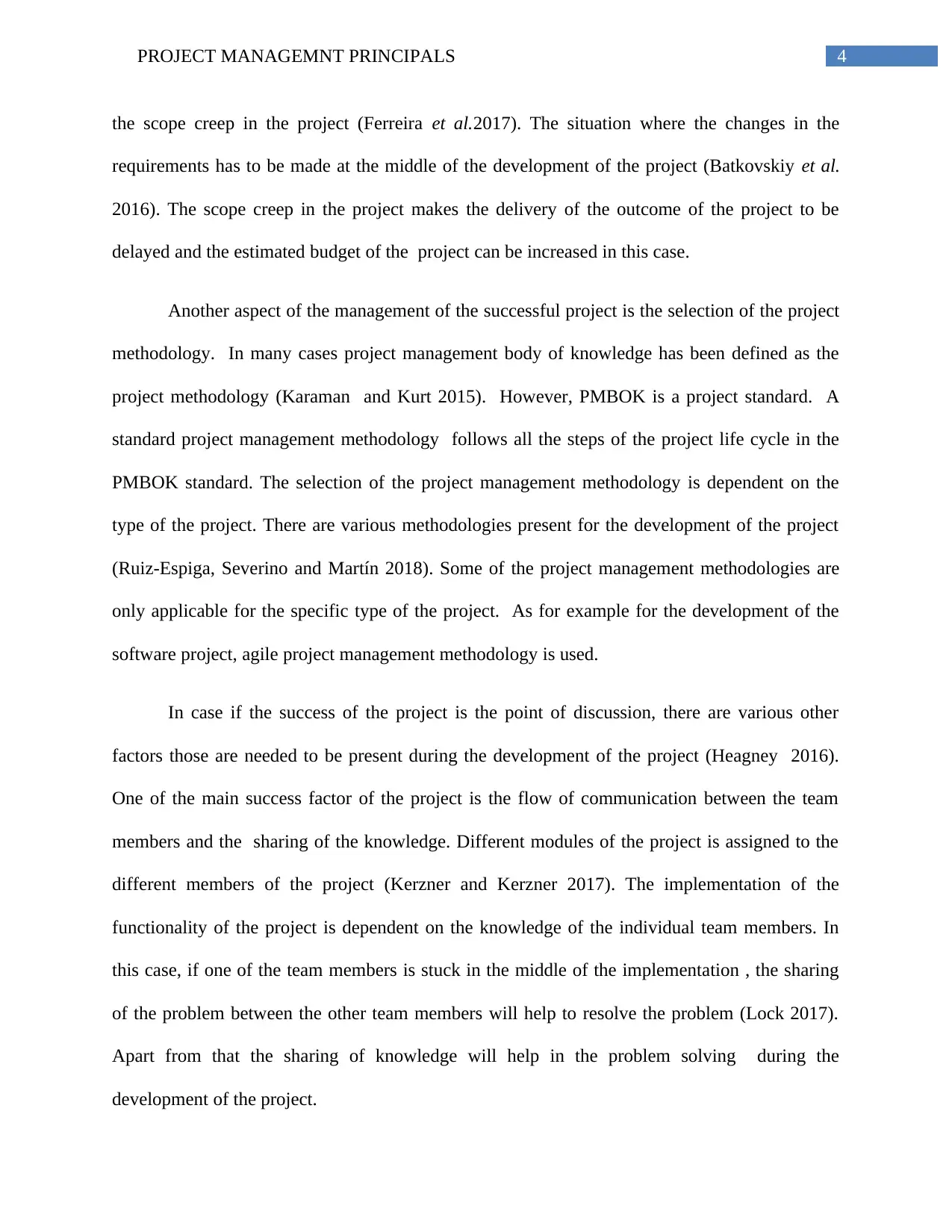
4PROJECT MANAGEMNT PRINCIPALS
the scope creep in the project (Ferreira et al.2017). The situation where the changes in the
requirements has to be made at the middle of the development of the project (Batkovskiy et al.
2016). The scope creep in the project makes the delivery of the outcome of the project to be
delayed and the estimated budget of the project can be increased in this case.
Another aspect of the management of the successful project is the selection of the project
methodology. In many cases project management body of knowledge has been defined as the
project methodology (Karaman and Kurt 2015). However, PMBOK is a project standard. A
standard project management methodology follows all the steps of the project life cycle in the
PMBOK standard. The selection of the project management methodology is dependent on the
type of the project. There are various methodologies present for the development of the project
(Ruiz-Espiga, Severino and Martín 2018). Some of the project management methodologies are
only applicable for the specific type of the project. As for example for the development of the
software project, agile project management methodology is used.
In case if the success of the project is the point of discussion, there are various other
factors those are needed to be present during the development of the project (Heagney 2016).
One of the main success factor of the project is the flow of communication between the team
members and the sharing of the knowledge. Different modules of the project is assigned to the
different members of the project (Kerzner and Kerzner 2017). The implementation of the
functionality of the project is dependent on the knowledge of the individual team members. In
this case, if one of the team members is stuck in the middle of the implementation , the sharing
of the problem between the other team members will help to resolve the problem (Lock 2017).
Apart from that the sharing of knowledge will help in the problem solving during the
development of the project.
the scope creep in the project (Ferreira et al.2017). The situation where the changes in the
requirements has to be made at the middle of the development of the project (Batkovskiy et al.
2016). The scope creep in the project makes the delivery of the outcome of the project to be
delayed and the estimated budget of the project can be increased in this case.
Another aspect of the management of the successful project is the selection of the project
methodology. In many cases project management body of knowledge has been defined as the
project methodology (Karaman and Kurt 2015). However, PMBOK is a project standard. A
standard project management methodology follows all the steps of the project life cycle in the
PMBOK standard. The selection of the project management methodology is dependent on the
type of the project. There are various methodologies present for the development of the project
(Ruiz-Espiga, Severino and Martín 2018). Some of the project management methodologies are
only applicable for the specific type of the project. As for example for the development of the
software project, agile project management methodology is used.
In case if the success of the project is the point of discussion, there are various other
factors those are needed to be present during the development of the project (Heagney 2016).
One of the main success factor of the project is the flow of communication between the team
members and the sharing of the knowledge. Different modules of the project is assigned to the
different members of the project (Kerzner and Kerzner 2017). The implementation of the
functionality of the project is dependent on the knowledge of the individual team members. In
this case, if one of the team members is stuck in the middle of the implementation , the sharing
of the problem between the other team members will help to resolve the problem (Lock 2017).
Apart from that the sharing of knowledge will help in the problem solving during the
development of the project.
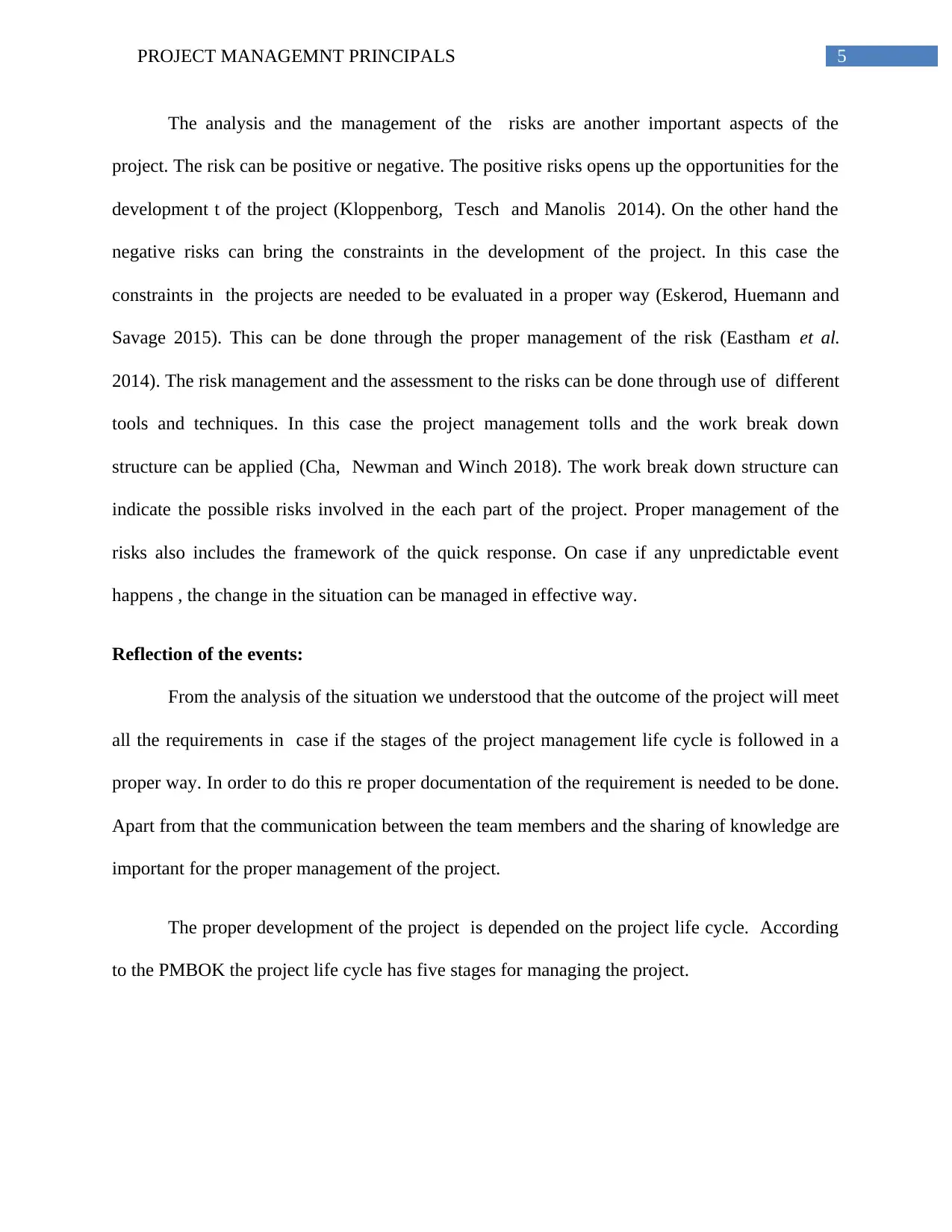
5PROJECT MANAGEMNT PRINCIPALS
The analysis and the management of the risks are another important aspects of the
project. The risk can be positive or negative. The positive risks opens up the opportunities for the
development t of the project (Kloppenborg, Tesch and Manolis 2014). On the other hand the
negative risks can bring the constraints in the development of the project. In this case the
constraints in the projects are needed to be evaluated in a proper way (Eskerod, Huemann and
Savage 2015). This can be done through the proper management of the risk (Eastham et al.
2014). The risk management and the assessment to the risks can be done through use of different
tools and techniques. In this case the project management tolls and the work break down
structure can be applied (Cha, Newman and Winch 2018). The work break down structure can
indicate the possible risks involved in the each part of the project. Proper management of the
risks also includes the framework of the quick response. On case if any unpredictable event
happens , the change in the situation can be managed in effective way.
Reflection of the events:
From the analysis of the situation we understood that the outcome of the project will meet
all the requirements in case if the stages of the project management life cycle is followed in a
proper way. In order to do this re proper documentation of the requirement is needed to be done.
Apart from that the communication between the team members and the sharing of knowledge are
important for the proper management of the project.
The proper development of the project is depended on the project life cycle. According
to the PMBOK the project life cycle has five stages for managing the project.
The analysis and the management of the risks are another important aspects of the
project. The risk can be positive or negative. The positive risks opens up the opportunities for the
development t of the project (Kloppenborg, Tesch and Manolis 2014). On the other hand the
negative risks can bring the constraints in the development of the project. In this case the
constraints in the projects are needed to be evaluated in a proper way (Eskerod, Huemann and
Savage 2015). This can be done through the proper management of the risk (Eastham et al.
2014). The risk management and the assessment to the risks can be done through use of different
tools and techniques. In this case the project management tolls and the work break down
structure can be applied (Cha, Newman and Winch 2018). The work break down structure can
indicate the possible risks involved in the each part of the project. Proper management of the
risks also includes the framework of the quick response. On case if any unpredictable event
happens , the change in the situation can be managed in effective way.
Reflection of the events:
From the analysis of the situation we understood that the outcome of the project will meet
all the requirements in case if the stages of the project management life cycle is followed in a
proper way. In order to do this re proper documentation of the requirement is needed to be done.
Apart from that the communication between the team members and the sharing of knowledge are
important for the proper management of the project.
The proper development of the project is depended on the project life cycle. According
to the PMBOK the project life cycle has five stages for managing the project.
⊘ This is a preview!⊘
Do you want full access?
Subscribe today to unlock all pages.

Trusted by 1+ million students worldwide
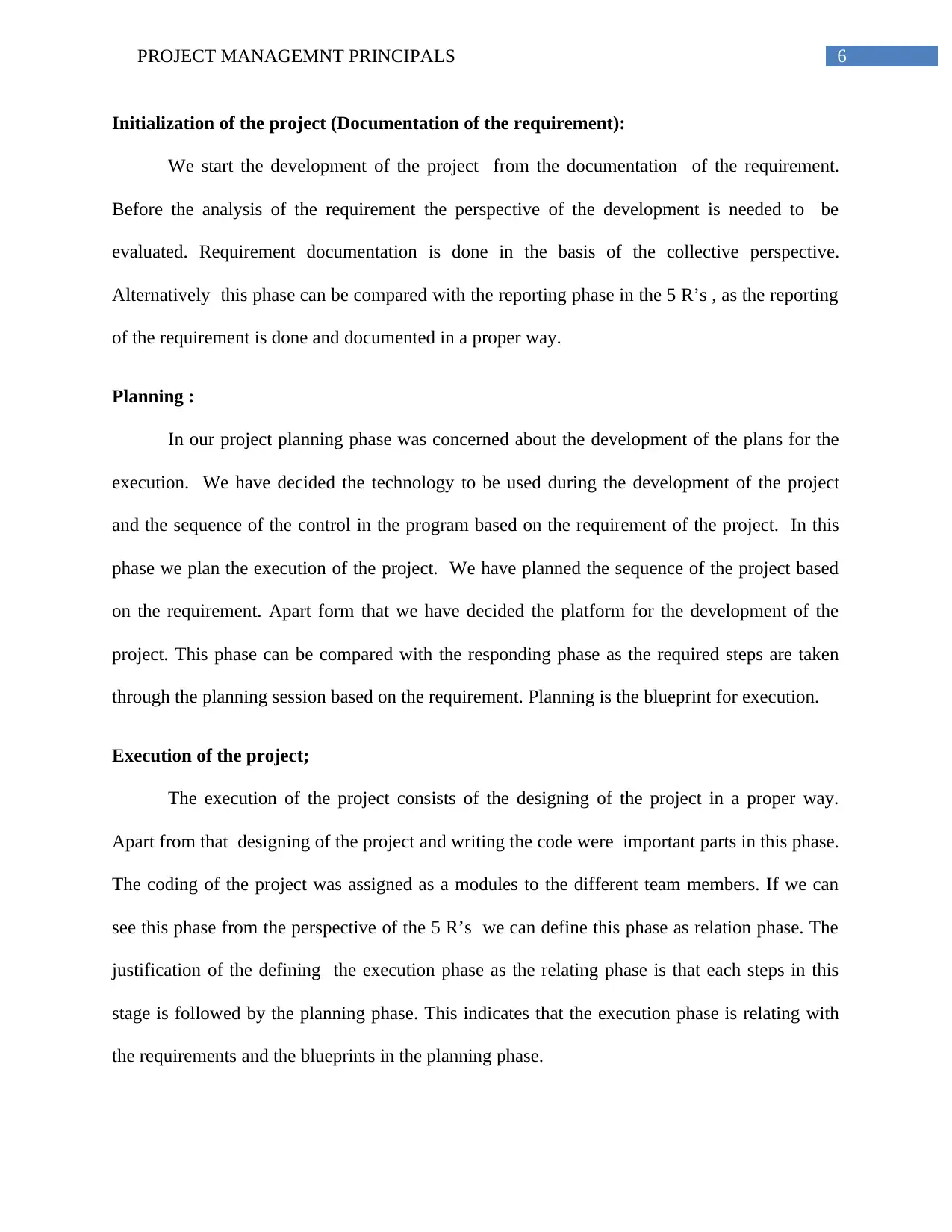
6PROJECT MANAGEMNT PRINCIPALS
Initialization of the project (Documentation of the requirement):
We start the development of the project from the documentation of the requirement.
Before the analysis of the requirement the perspective of the development is needed to be
evaluated. Requirement documentation is done in the basis of the collective perspective.
Alternatively this phase can be compared with the reporting phase in the 5 R’s , as the reporting
of the requirement is done and documented in a proper way.
Planning :
In our project planning phase was concerned about the development of the plans for the
execution. We have decided the technology to be used during the development of the project
and the sequence of the control in the program based on the requirement of the project. In this
phase we plan the execution of the project. We have planned the sequence of the project based
on the requirement. Apart form that we have decided the platform for the development of the
project. This phase can be compared with the responding phase as the required steps are taken
through the planning session based on the requirement. Planning is the blueprint for execution.
Execution of the project;
The execution of the project consists of the designing of the project in a proper way.
Apart from that designing of the project and writing the code were important parts in this phase.
The coding of the project was assigned as a modules to the different team members. If we can
see this phase from the perspective of the 5 R’s we can define this phase as relation phase. The
justification of the defining the execution phase as the relating phase is that each steps in this
stage is followed by the planning phase. This indicates that the execution phase is relating with
the requirements and the blueprints in the planning phase.
Initialization of the project (Documentation of the requirement):
We start the development of the project from the documentation of the requirement.
Before the analysis of the requirement the perspective of the development is needed to be
evaluated. Requirement documentation is done in the basis of the collective perspective.
Alternatively this phase can be compared with the reporting phase in the 5 R’s , as the reporting
of the requirement is done and documented in a proper way.
Planning :
In our project planning phase was concerned about the development of the plans for the
execution. We have decided the technology to be used during the development of the project
and the sequence of the control in the program based on the requirement of the project. In this
phase we plan the execution of the project. We have planned the sequence of the project based
on the requirement. Apart form that we have decided the platform for the development of the
project. This phase can be compared with the responding phase as the required steps are taken
through the planning session based on the requirement. Planning is the blueprint for execution.
Execution of the project;
The execution of the project consists of the designing of the project in a proper way.
Apart from that designing of the project and writing the code were important parts in this phase.
The coding of the project was assigned as a modules to the different team members. If we can
see this phase from the perspective of the 5 R’s we can define this phase as relation phase. The
justification of the defining the execution phase as the relating phase is that each steps in this
stage is followed by the planning phase. This indicates that the execution phase is relating with
the requirements and the blueprints in the planning phase.
Paraphrase This Document
Need a fresh take? Get an instant paraphrase of this document with our AI Paraphraser
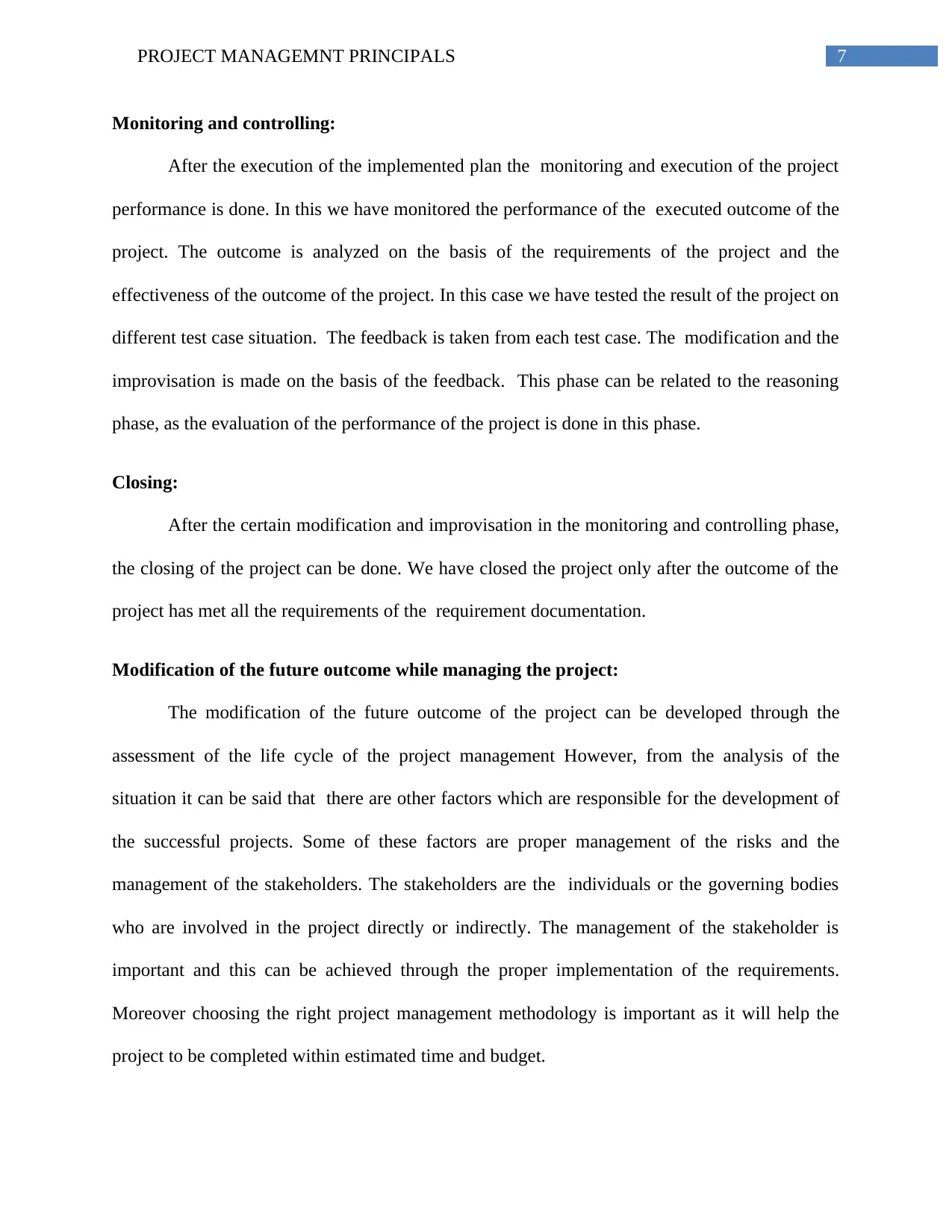
7PROJECT MANAGEMNT PRINCIPALS
Monitoring and controlling:
After the execution of the implemented plan the monitoring and execution of the project
performance is done. In this we have monitored the performance of the executed outcome of the
project. The outcome is analyzed on the basis of the requirements of the project and the
effectiveness of the outcome of the project. In this case we have tested the result of the project on
different test case situation. The feedback is taken from each test case. The modification and the
improvisation is made on the basis of the feedback. This phase can be related to the reasoning
phase, as the evaluation of the performance of the project is done in this phase.
Closing:
After the certain modification and improvisation in the monitoring and controlling phase,
the closing of the project can be done. We have closed the project only after the outcome of the
project has met all the requirements of the requirement documentation.
Modification of the future outcome while managing the project:
The modification of the future outcome of the project can be developed through the
assessment of the life cycle of the project management However, from the analysis of the
situation it can be said that there are other factors which are responsible for the development of
the successful projects. Some of these factors are proper management of the risks and the
management of the stakeholders. The stakeholders are the individuals or the governing bodies
who are involved in the project directly or indirectly. The management of the stakeholder is
important and this can be achieved through the proper implementation of the requirements.
Moreover choosing the right project management methodology is important as it will help the
project to be completed within estimated time and budget.
Monitoring and controlling:
After the execution of the implemented plan the monitoring and execution of the project
performance is done. In this we have monitored the performance of the executed outcome of the
project. The outcome is analyzed on the basis of the requirements of the project and the
effectiveness of the outcome of the project. In this case we have tested the result of the project on
different test case situation. The feedback is taken from each test case. The modification and the
improvisation is made on the basis of the feedback. This phase can be related to the reasoning
phase, as the evaluation of the performance of the project is done in this phase.
Closing:
After the certain modification and improvisation in the monitoring and controlling phase,
the closing of the project can be done. We have closed the project only after the outcome of the
project has met all the requirements of the requirement documentation.
Modification of the future outcome while managing the project:
The modification of the future outcome of the project can be developed through the
assessment of the life cycle of the project management However, from the analysis of the
situation it can be said that there are other factors which are responsible for the development of
the successful projects. Some of these factors are proper management of the risks and the
management of the stakeholders. The stakeholders are the individuals or the governing bodies
who are involved in the project directly or indirectly. The management of the stakeholder is
important and this can be achieved through the proper implementation of the requirements.
Moreover choosing the right project management methodology is important as it will help the
project to be completed within estimated time and budget.
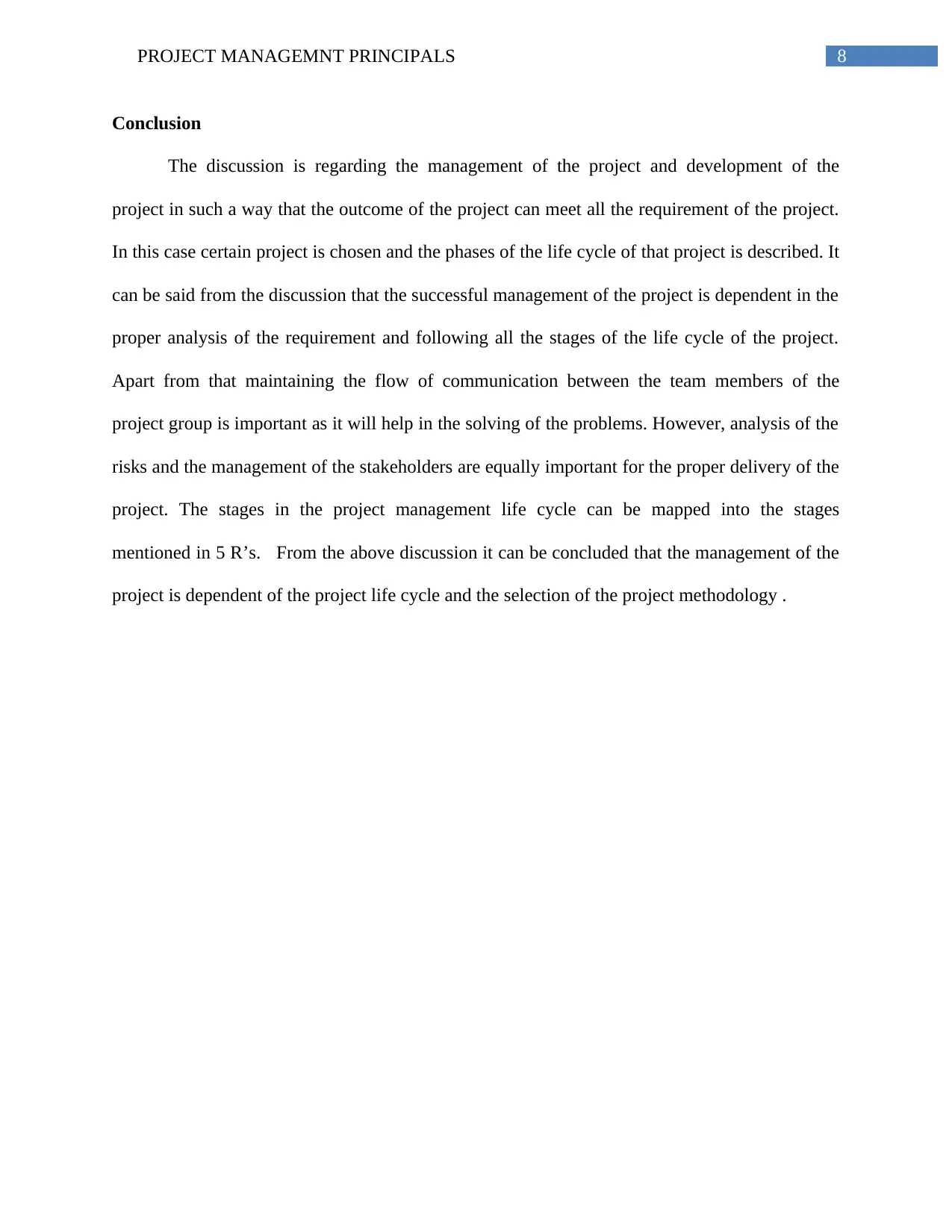
8PROJECT MANAGEMNT PRINCIPALS
Conclusion
The discussion is regarding the management of the project and development of the
project in such a way that the outcome of the project can meet all the requirement of the project.
In this case certain project is chosen and the phases of the life cycle of that project is described. It
can be said from the discussion that the successful management of the project is dependent in the
proper analysis of the requirement and following all the stages of the life cycle of the project.
Apart from that maintaining the flow of communication between the team members of the
project group is important as it will help in the solving of the problems. However, analysis of the
risks and the management of the stakeholders are equally important for the proper delivery of the
project. The stages in the project management life cycle can be mapped into the stages
mentioned in 5 R’s. From the above discussion it can be concluded that the management of the
project is dependent of the project life cycle and the selection of the project methodology .
Conclusion
The discussion is regarding the management of the project and development of the
project in such a way that the outcome of the project can meet all the requirement of the project.
In this case certain project is chosen and the phases of the life cycle of that project is described. It
can be said from the discussion that the successful management of the project is dependent in the
proper analysis of the requirement and following all the stages of the life cycle of the project.
Apart from that maintaining the flow of communication between the team members of the
project group is important as it will help in the solving of the problems. However, analysis of the
risks and the management of the stakeholders are equally important for the proper delivery of the
project. The stages in the project management life cycle can be mapped into the stages
mentioned in 5 R’s. From the above discussion it can be concluded that the management of the
project is dependent of the project life cycle and the selection of the project methodology .
⊘ This is a preview!⊘
Do you want full access?
Subscribe today to unlock all pages.

Trusted by 1+ million students worldwide
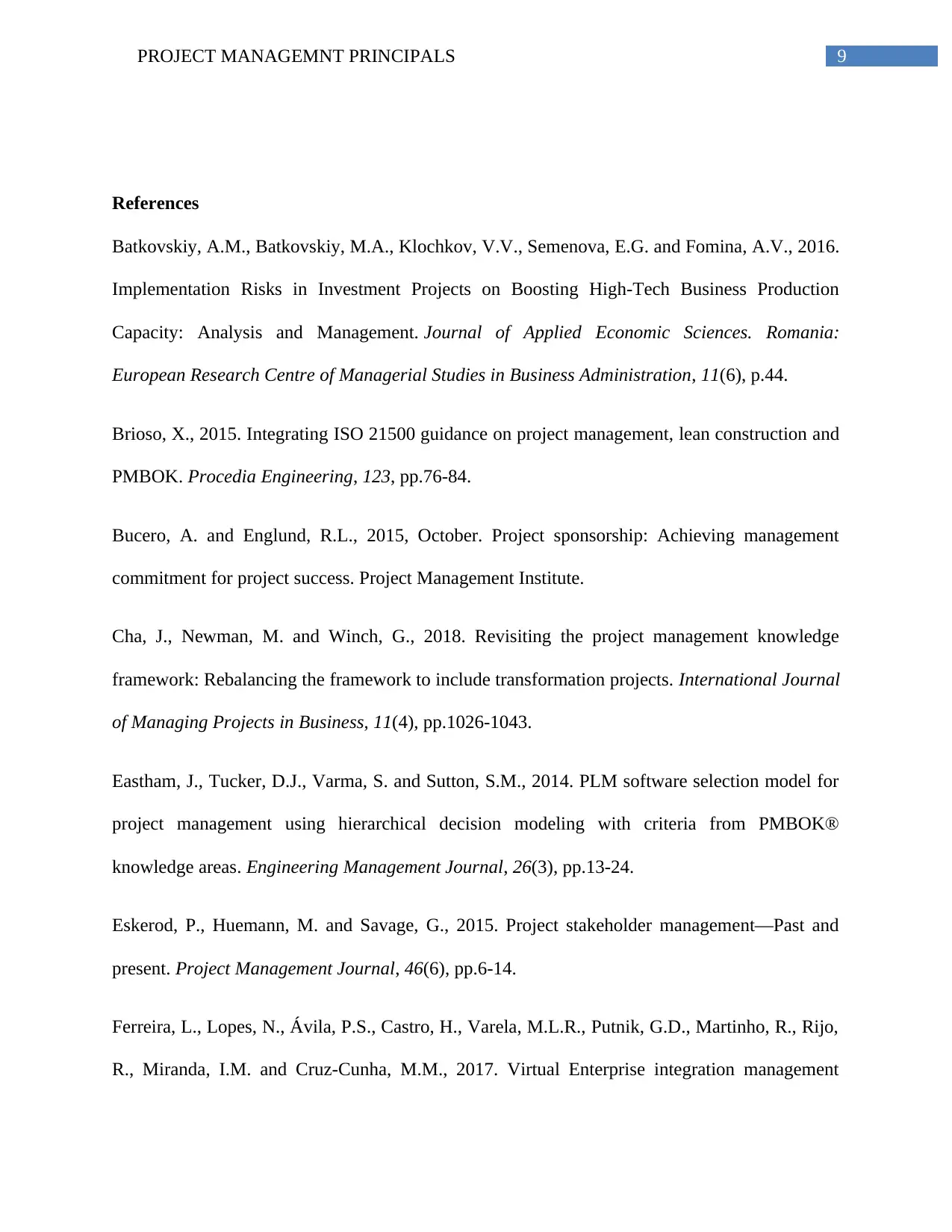
9PROJECT MANAGEMNT PRINCIPALS
References
Batkovskiy, A.M., Batkovskiy, M.A., Klochkov, V.V., Semenova, E.G. and Fomina, A.V., 2016.
Implementation Risks in Investment Projects on Boosting High-Tech Business Production
Capacity: Analysis and Management. Journal of Applied Economic Sciences. Romania:
European Research Centre of Managerial Studies in Business Administration, 11(6), p.44.
Brioso, X., 2015. Integrating ISO 21500 guidance on project management, lean construction and
PMBOK. Procedia Engineering, 123, pp.76-84.
Bucero, A. and Englund, R.L., 2015, October. Project sponsorship: Achieving management
commitment for project success. Project Management Institute.
Cha, J., Newman, M. and Winch, G., 2018. Revisiting the project management knowledge
framework: Rebalancing the framework to include transformation projects. International Journal
of Managing Projects in Business, 11(4), pp.1026-1043.
Eastham, J., Tucker, D.J., Varma, S. and Sutton, S.M., 2014. PLM software selection model for
project management using hierarchical decision modeling with criteria from PMBOK®
knowledge areas. Engineering Management Journal, 26(3), pp.13-24.
Eskerod, P., Huemann, M. and Savage, G., 2015. Project stakeholder management—Past and
present. Project Management Journal, 46(6), pp.6-14.
Ferreira, L., Lopes, N., Ávila, P.S., Castro, H., Varela, M.L.R., Putnik, G.D., Martinho, R., Rijo,
R., Miranda, I.M. and Cruz-Cunha, M.M., 2017. Virtual Enterprise integration management
References
Batkovskiy, A.M., Batkovskiy, M.A., Klochkov, V.V., Semenova, E.G. and Fomina, A.V., 2016.
Implementation Risks in Investment Projects on Boosting High-Tech Business Production
Capacity: Analysis and Management. Journal of Applied Economic Sciences. Romania:
European Research Centre of Managerial Studies in Business Administration, 11(6), p.44.
Brioso, X., 2015. Integrating ISO 21500 guidance on project management, lean construction and
PMBOK. Procedia Engineering, 123, pp.76-84.
Bucero, A. and Englund, R.L., 2015, October. Project sponsorship: Achieving management
commitment for project success. Project Management Institute.
Cha, J., Newman, M. and Winch, G., 2018. Revisiting the project management knowledge
framework: Rebalancing the framework to include transformation projects. International Journal
of Managing Projects in Business, 11(4), pp.1026-1043.
Eastham, J., Tucker, D.J., Varma, S. and Sutton, S.M., 2014. PLM software selection model for
project management using hierarchical decision modeling with criteria from PMBOK®
knowledge areas. Engineering Management Journal, 26(3), pp.13-24.
Eskerod, P., Huemann, M. and Savage, G., 2015. Project stakeholder management—Past and
present. Project Management Journal, 46(6), pp.6-14.
Ferreira, L., Lopes, N., Ávila, P.S., Castro, H., Varela, M.L.R., Putnik, G.D., Martinho, R., Rijo,
R., Miranda, I.M. and Cruz-Cunha, M.M., 2017. Virtual Enterprise integration management
Paraphrase This Document
Need a fresh take? Get an instant paraphrase of this document with our AI Paraphraser
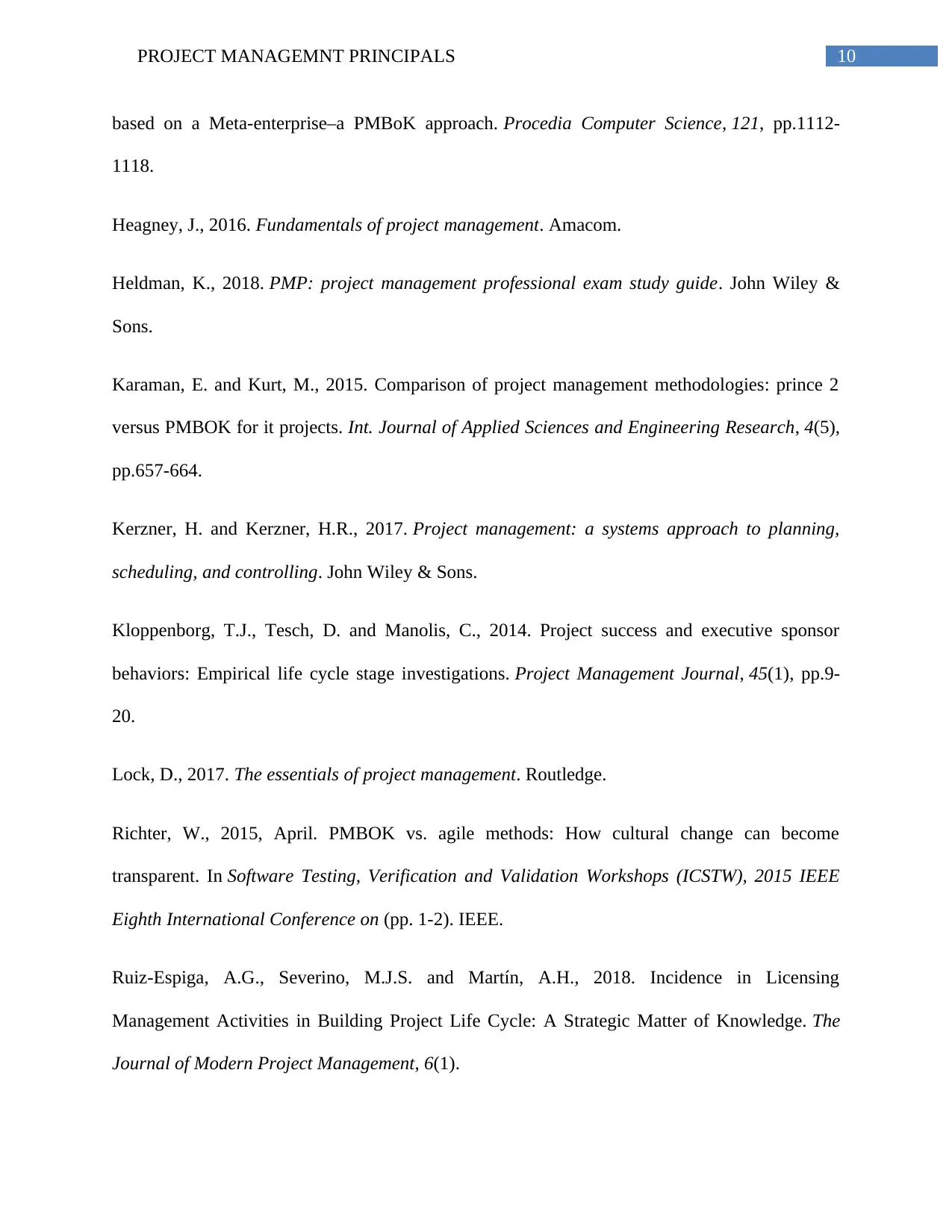
10PROJECT MANAGEMNT PRINCIPALS
based on a Meta-enterprise–a PMBoK approach. Procedia Computer Science, 121, pp.1112-
1118.
Heagney, J., 2016. Fundamentals of project management. Amacom.
Heldman, K., 2018. PMP: project management professional exam study guide. John Wiley &
Sons.
Karaman, E. and Kurt, M., 2015. Comparison of project management methodologies: prince 2
versus PMBOK for it projects. Int. Journal of Applied Sciences and Engineering Research, 4(5),
pp.657-664.
Kerzner, H. and Kerzner, H.R., 2017. Project management: a systems approach to planning,
scheduling, and controlling. John Wiley & Sons.
Kloppenborg, T.J., Tesch, D. and Manolis, C., 2014. Project success and executive sponsor
behaviors: Empirical life cycle stage investigations. Project Management Journal, 45(1), pp.9-
20.
Lock, D., 2017. The essentials of project management. Routledge.
Richter, W., 2015, April. PMBOK vs. agile methods: How cultural change can become
transparent. In Software Testing, Verification and Validation Workshops (ICSTW), 2015 IEEE
Eighth International Conference on (pp. 1-2). IEEE.
Ruiz-Espiga, A.G., Severino, M.J.S. and Martín, A.H., 2018. Incidence in Licensing
Management Activities in Building Project Life Cycle: A Strategic Matter of Knowledge. The
Journal of Modern Project Management, 6(1).
based on a Meta-enterprise–a PMBoK approach. Procedia Computer Science, 121, pp.1112-
1118.
Heagney, J., 2016. Fundamentals of project management. Amacom.
Heldman, K., 2018. PMP: project management professional exam study guide. John Wiley &
Sons.
Karaman, E. and Kurt, M., 2015. Comparison of project management methodologies: prince 2
versus PMBOK for it projects. Int. Journal of Applied Sciences and Engineering Research, 4(5),
pp.657-664.
Kerzner, H. and Kerzner, H.R., 2017. Project management: a systems approach to planning,
scheduling, and controlling. John Wiley & Sons.
Kloppenborg, T.J., Tesch, D. and Manolis, C., 2014. Project success and executive sponsor
behaviors: Empirical life cycle stage investigations. Project Management Journal, 45(1), pp.9-
20.
Lock, D., 2017. The essentials of project management. Routledge.
Richter, W., 2015, April. PMBOK vs. agile methods: How cultural change can become
transparent. In Software Testing, Verification and Validation Workshops (ICSTW), 2015 IEEE
Eighth International Conference on (pp. 1-2). IEEE.
Ruiz-Espiga, A.G., Severino, M.J.S. and Martín, A.H., 2018. Incidence in Licensing
Management Activities in Building Project Life Cycle: A Strategic Matter of Knowledge. The
Journal of Modern Project Management, 6(1).

11PROJECT MANAGEMNT PRINCIPALS
Varajão, J., Colomo-Palacios, R. and Silva, H., 2017. ISO 21500: 2012 and PMBoK 5 processes
in information systems project management. Computer Standards & Interfaces, 50, pp.216-222.
Varajão, J., Colomo-Palacios, R. and Silva, H., 2017. ISO 21500: 2012 and PMBoK 5 processes
in information systems project management. Computer Standards & Interfaces, 50, pp.216-222.
⊘ This is a preview!⊘
Do you want full access?
Subscribe today to unlock all pages.

Trusted by 1+ million students worldwide
1 out of 12
Related Documents
Your All-in-One AI-Powered Toolkit for Academic Success.
+13062052269
info@desklib.com
Available 24*7 on WhatsApp / Email
![[object Object]](/_next/static/media/star-bottom.7253800d.svg)
Unlock your academic potential
Copyright © 2020–2026 A2Z Services. All Rights Reserved. Developed and managed by ZUCOL.



